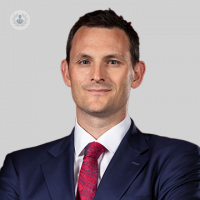Decompression surgery to treat compressed sinal nerves
Escrito por:Spinal cord and nerve root compression can occur when excess pressure is applied to a nerve in or on exiting the spinal canal. There is a breadth of reasons why this pain may occur, but a successful treatment for compressed spinal nerves is decompression surgery. Expert consultant spinal surgeon Mr Alex Torrie, who treats patients in Cheltenham and Gloucester, shares his knowledge on the condition and offers specialist insight into the treatment.

What is spinal decompression surgery?
Spinal decompression surgery is a common and routine spinal operation conducted globally. It involves removing pressure from the nerves in the spine, anywhere from the base of your head to your pelvis. These nerves include the spinal cord, the nerves in the lower back that are responsible for controlling your legs, bowel and bladder continence, and sexual function called cauda equina, and the spinal nerve roots (the nerves as they exit the spinal canal) in an effort to improve the patients’ symptoms. Each operation is highly specific and a bespoke tailored approach is required for each individual patient.
What causes spinal nerve compression?
The nerve compression can often be caused by:
- a slipped disc, such as an intervertebral disc herniation, prolapse, or protrusion
- ligamentum enlargement (flavum hypertrophy)
- facet joint enlargement, which is similar to an arthritic knuckle seen in the hand
- mechanical spinal instability, where one segment of the spine slides forwards (relative to the next segment) and compresses the nerves.
What test can detect compressed nerves?
Investigation for spinal neural compression routinely involves an MRI scan, possibly with a standing X-ray of the spine. It is well-recognised that nerve compression is more likely to occur with advancing age and that this is a normal part of the aging process. Different patients with identical MRI scan findings can present with very different symptoms. Indeed, the same patient with the same MRI findings taken a year before can also have very varied symptoms.
It, therefore, is essential that the combination of the patients’ contemporaneous clinical history, examination, and imaging are all assessed and correlated by an appropriately trained spinal specialist. They should never be reviewed in isolation.
Can a compressed nerve heal itself?
If the symptoms of spinal nerve compression are left to run their own course without intervention, known as the natural history of your symptoms, they may improve spontaneously over time. The evidence to support medications, specific exercises, or manual therapies in being able to shorten the natural history of your symptoms related to nerve compression is not conclusive albeit meaningful symptom relief can be experienced.
How successful is spinal nerve decompression surgery?
The success rate of spinal decompressive surgery varies depending on the primary diagnosis. Decompression for a ‘slipped disc’ will typically provide meaningful symptom relief of the leg pain in up to 9 out of 10 patients, whilst decompression for spinal stenosis, nerve compression in the aging/degenerate spine, will usually provide meaningful leg symptom relief in up to 8 out of 10 patients. Improvement in back pain with decompressive surgery is more variable again and is not typically the primary reason for spinal decompressive surgery. Revision (redo) spinal surgery tends to be more complicated with more risk than the first operation and the overall success rates tend to be lower.
What is recommended during spinal decompression surgery recovery?
Post-operative advice will vary depending on the specifics of your decompression operation. However, generally, it is accepted that the wound will typically be covered with a dressing for 10 to 14 days. You can sit and walk from day 1 as pain allows, and it is often necessary to avoid heavy lifting from 4 to 12 weeks usually to avoid further disc prolapse or prevent failure of the metalwork if rods and screws were required. Most people will return to driving within 2 to 4 weeks albeit your insurance is strictly an agreement between you and your insurer.
If you are interested in finding out information about decompression surgery and would like to book a consultation with leading consultant spinal surgeon Mr Alex Torrie, you can do so by visiting his Top Doctors profile.


